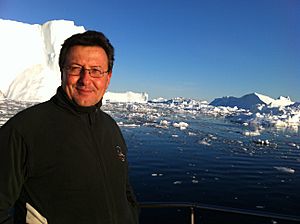Carlos M. Duarte facts for kids
Quick facts for kids
Carlos Duarte
|
|
|---|---|
 |
|
| Born |
Carlos Manuel Duarte
July 27, 1960 Lisbon, Portugal
|
| Nationality | Spanish |
| Alma mater | Autonomous University of Madrid McGill University |
| Known for | Malaspina Expedition 2010, Scientific Basis for Blue Carbon |
| Scientific career | |
| Fields | Biology, Ecology |
| Institutions |
|
| Academic advisors | Jacob Kalff |
Carlos Manuel Duarte is a famous marine ecologist. This means he studies the ocean and all the living things in it. He looks at how many different kinds of life are in the ocean. He also studies how people affect the ocean and how marine life can get better after problems.
Dr. Duarte works with many different kinds of scientists and engineers. They team up to solve big problems for the ocean and for people. He is currently a top professor at the King Abdullah University of Science and Technology. He also leads the Coral Research and Development Accelerator Platform.
Contents
Learning About the Ocean
Carlos Duarte's Education
Carlos Duarte studied environmental biology at the Autonomous University of Madrid in Spain. He earned his first degree there in 1982. Later, in 1987, he got his Ph.D. in limnology from McGill University. Limnology is the study of freshwater lakes and rivers.
A Career in Marine Science
Working Around the World
After finishing his Ph.D., Dr. Duarte returned to Spain. He worked as a researcher at different science centers. These included the Instituto de Ciencias del Mar and the Mediterranean Institute for Advanced Studies.
In 2011, he became the first director of the UWA Oceans Institute in Australia. In 2015, he moved to the King Abdullah University of Science and Technology (KAUST). There, he led the Red Sea Research Center from 2016 to 2018. He also joined the Computational Biology Research Center at KAUST in 2017.
Sharing Knowledge
Dr. Duarte is the main editor for Frontiers in Marine Science, a science journal. He has also worked on many other science magazines. He has written over 900 science papers and many books. He has also taught and guided many students and new researchers.
He was the elected President of the American Society of Limnology and Oceanography. This is a very large group for marine scientists. He has won many awards for his important research.
Top Scientist Recognition
Carlos Duarte is known as a "Highly Cited Researcher." This means his papers are often used and quoted by other scientists. In 2019, he was ranked among the top 0.01% of all scientists in the world. He was also the top marine scientist in his field. In 2021, Reuters named him the 12th most important climate scientist globally. Since 2021, Dr. Duarte has also been the leader of the Global Coral R&D Accelerator Platform (CORDAP). In October 2021, he became an Academic with the Spanish Royal Academy of Sciences. This was for his big contributions to understanding ocean ecosystems.
Important Research Projects
Studying Water Plants and Climate Change
Dr. Duarte first studied freshwater plants in rivers and lakes. He also looked at how these freshwater places affect the carbon cycle. His work on seagrass meadows and other coastal plants led to "Blue Carbon" strategies. These strategies help fight climate change by using the ocean's natural ability to store carbon. He worked with different UN groups on this.
Exploring the Deep Ocean
Dr. Duarte realized we didn't know much about the deep ocean. So, he led the Malaspina Circumnavigation Expedition. Over 500 scientists took part in this journey. They sailed around the world between 2010 and 2011. Their goal was to learn more about the deep-sea ecosystem. The Malaspina Expedition 2010 has produced over 200 papers. These papers share new information about the life and workings of the deep ocean.
Bringing Ocean Life Back
In 2020, Dr. Duarte led a team that looked at how marine life recovers. They found that if we reduce harmful activities, ocean life can bounce back. They believe that we can bring back the abundance of marine life by 2050. They even created a plan to achieve this big goal.
Awards and Honors
- 2025, Japan Prize in "Biological Production, Ecology/Environment"
- 2021, Appointed Academic with Spanish Royal Academy of Sciences
- 2019, BBVA Foundation Frontiers of Knowledge Awards in Ecology and Conservation Biology
- 2019, Ramon Margalef Prize in Ecology
- 2018, Appointed to the Global Advisory Board of "The Red Sea Project"
- 2018, Elected Fellow to the European Academy of Science and Technology
- 2018, The Carlo Heip International Award for marine biodiversity science
- 2016, Elected Sustaining Fellow of the Association for the Sciences of Limnology and Oceanography
- 2016, Vladimir Ivanovich Vernadsky Medal for Excellence in Biogeosciences
- 2011, Honorary Doctorate from Utrecht University, The Netherlands
- 2011, Prix d’Excellence of the International Council for the Exploration of the Sea
- 2010, Honorary Doctorate from the Université du Québec à Montréal, Canada
- 2009, King James I Award on Environmental Research
- 2007, Spanish National Science Award in Natural Resources
- 2001, G. Evelyn Hutchinson Award, American Society of Limnology and Oceanography
See also
 In Spanish: Carlos M. Duarte para niños
In Spanish: Carlos M. Duarte para niños
 | Frances Mary Albrier |
 | Whitney Young |
 | Muhammad Ali |

